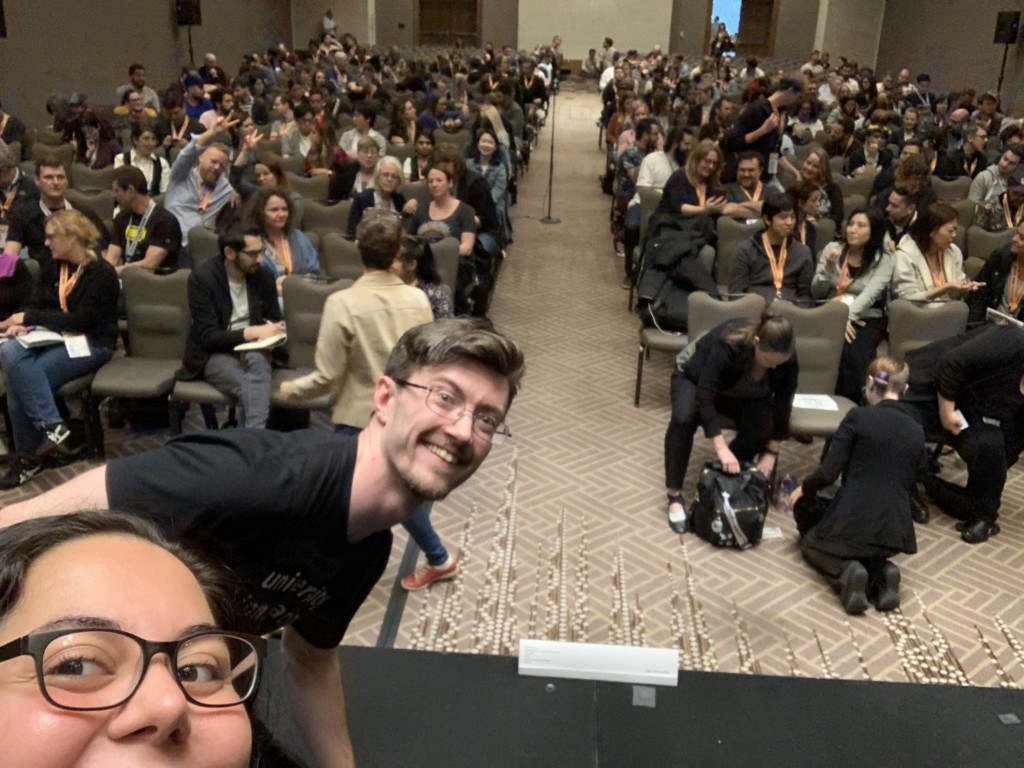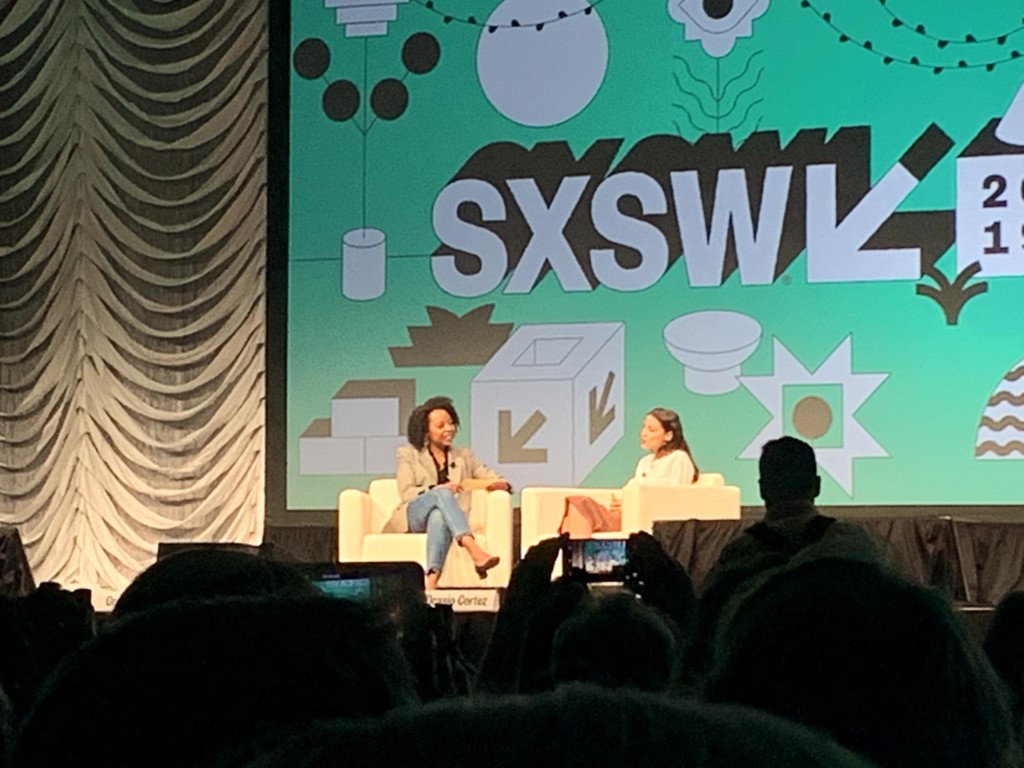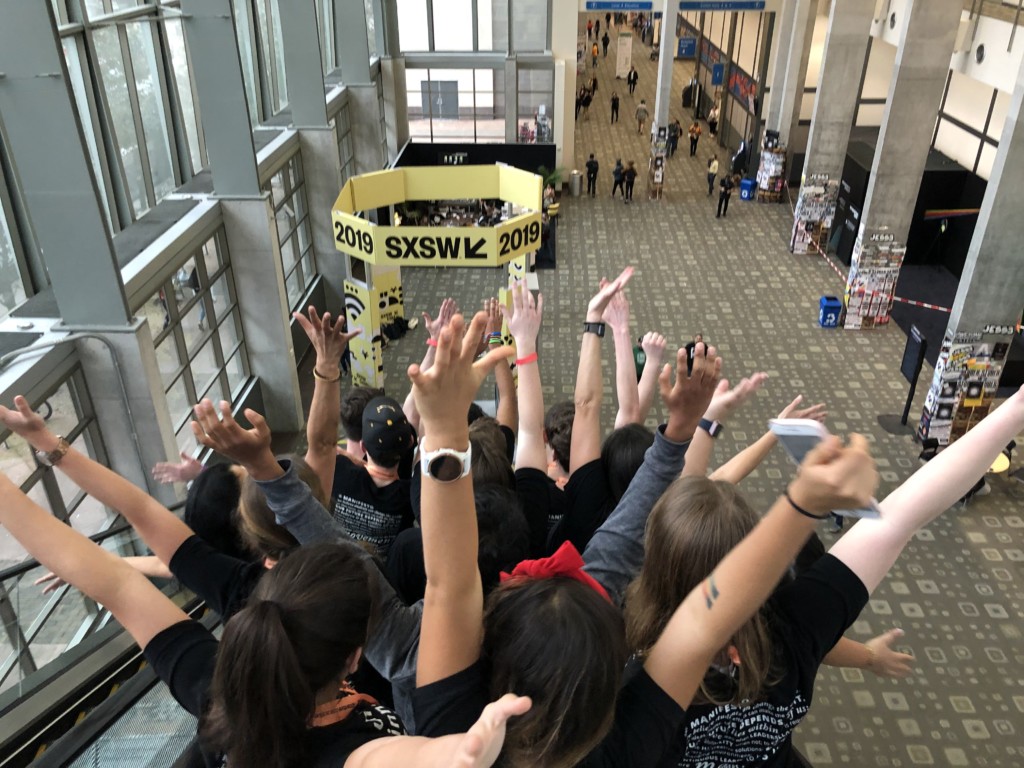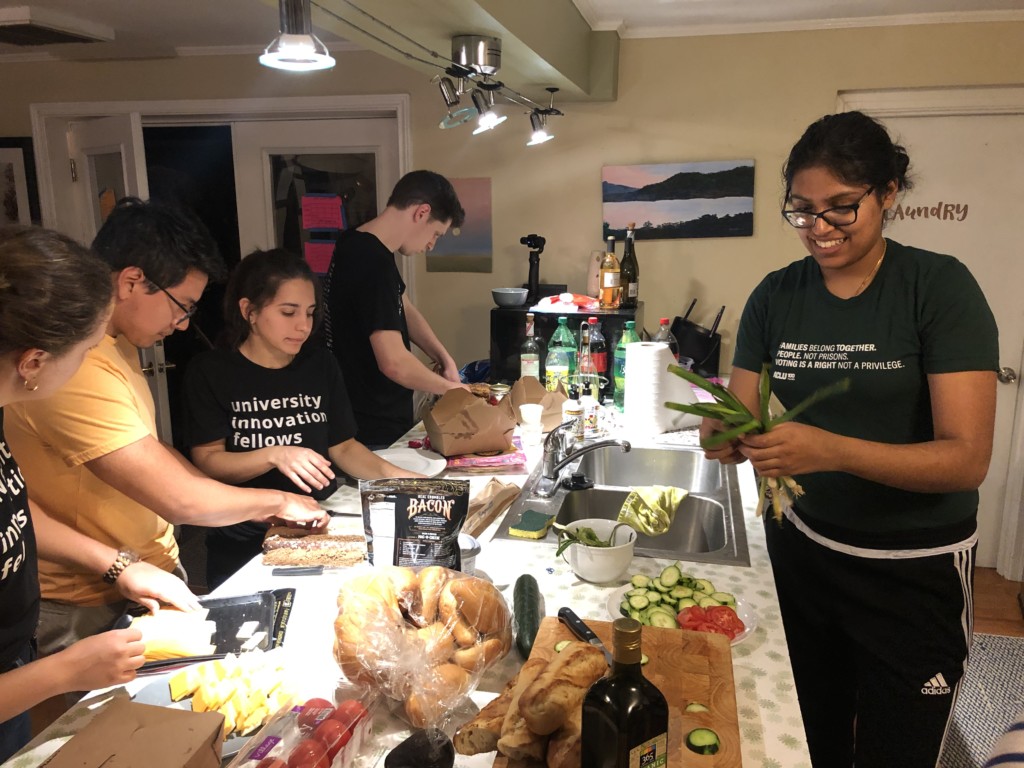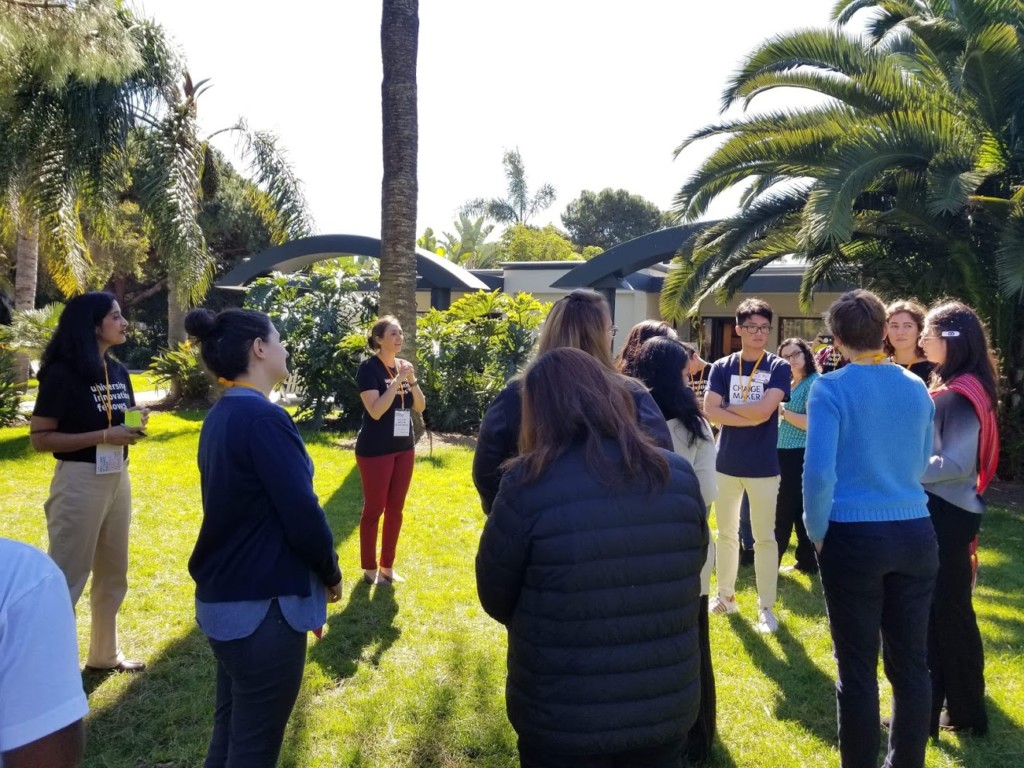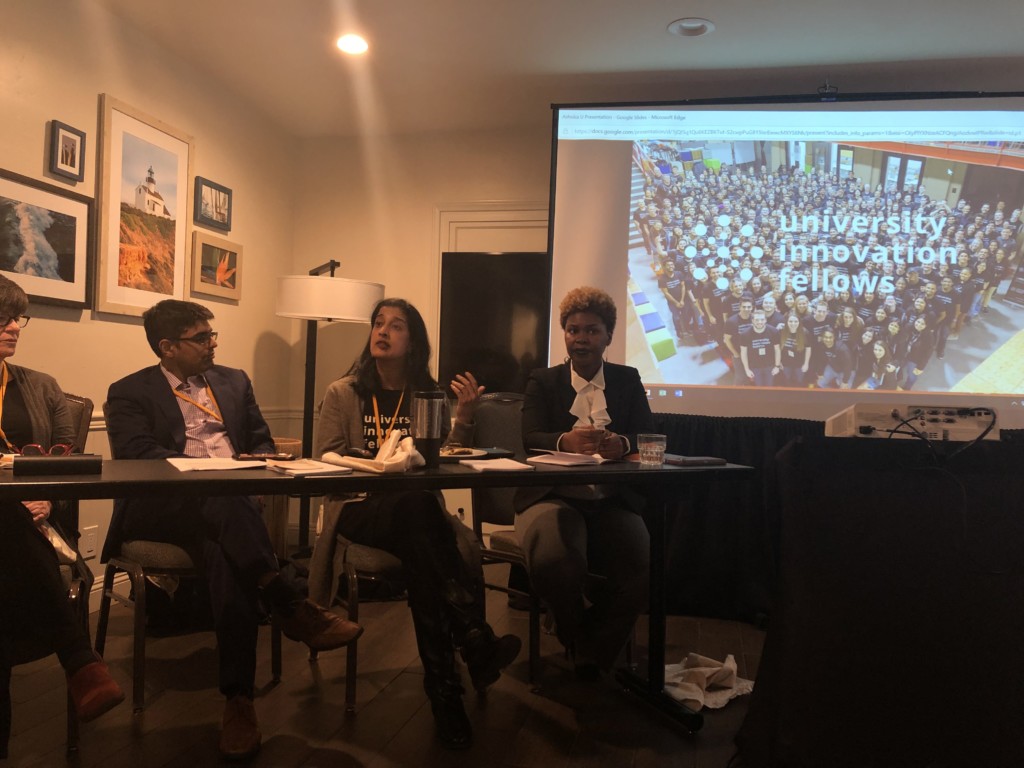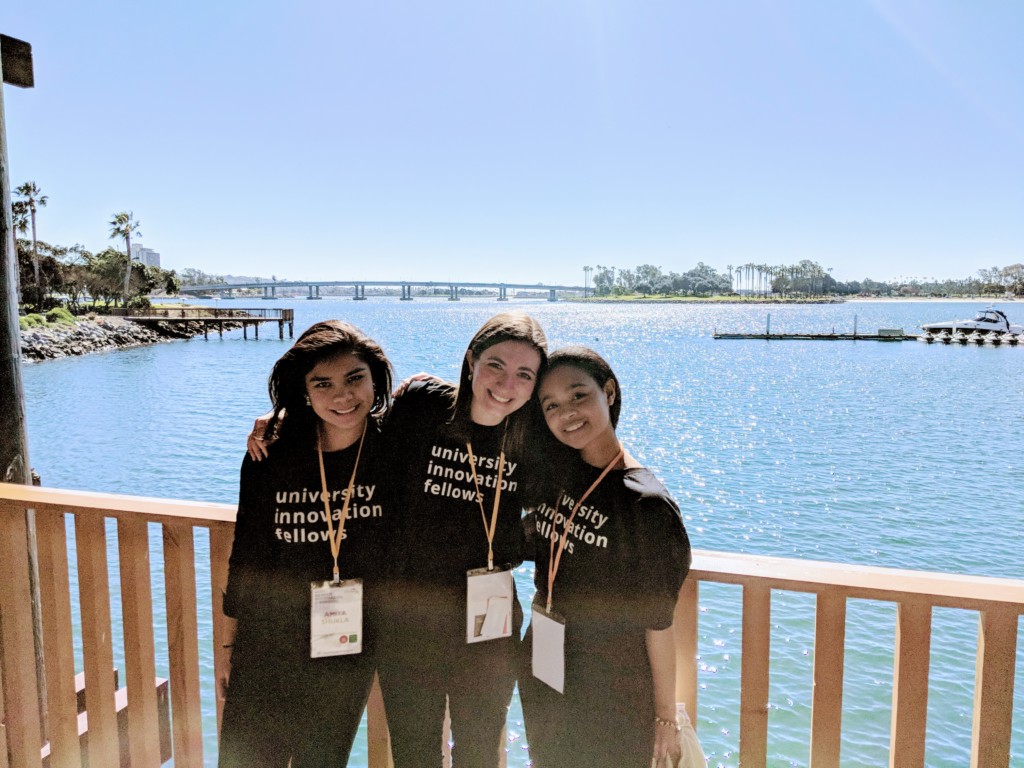Fellows Take on SXSW 2019
15 Fellows joined UIF co-directors Humera Fasihuddin and Leticia Britos Cavagnaro for SXSW in Austin, TX, in March 2019. They spent several days together learning from speakers, engaging participants, and connecting with one another.
Below are a few of their reflections on the experience.
A Scoot Through SXSW
By Jessica Aldrich, Wichita State University
After sitting in Austin traffic for what felt like hours, I was anxious to get to our house to see all of the other Fellows we would be staying with. As soon as I saw an electric scooter, I knew I found my way out of the car and to the house faster. I hopped out while we were at a stoplight and began racing my team there, hoping to beat them by a few minutes.
From that beginning action, the week didn’t slow down. I had an incredible experience exploring the city and creating deeper relationships with Fellows from across the world. I listened to talks by Alexandria Ocasio-Cortez and Priscilla Chan and gained key insights about diversity, the future of healthcare, and experienced mindfulness in new ways. Many of my favorite moments were spent scooting around a new place with new friends, learning about their experiences and perspectives.
My four key takeaways from this experience were:
- Don’t be afraid to attend sessions outside of your comfort zone. I took the chance to attend a mentoring session with Mona Al-Mukhaizeem, a VC from Kuwait who began her career as an engineer before turning to investments.
- During a session titled “The US is Racist AF” I gained insights connecting pop culture to current events, learning that when a movement begins to get strong, the music does also.
- Alexandria Ocasio-Cortez empowered young women, especially those from diverse backgrounds to stop trying to navigate systems of power, and instead start building our own.
- You can scoot anywhere if you’re brave enough, and can find one that’s charged.
I am missing the friends and community that I built during that week dearly, but I could not be more thankful for the experiences and all that I learned during that time!
The People Behind the Talks
By Spencer Lueckenotto, Wichita State University
You never know who you might meet at a conference like SXSW. Just walking on the sidewalks alone, I was introduced to successful entrepreneurs who wanted to extend their networks, as well as independent filmmakers hoping to gain a following from the masses. Around every corner, there were people willing to mingle and hear your story just as you would listen to theirs. However, the passersby were just the beginning.
Just this past semester, my roommate (who is also part of the UIFam) and I started a new student organization on our campus. We named it the Shocker Quad Club; Shocker for our campus mascot, and Quad for quadcopter (more commonly known as a drone). Our goal for this was to bring in interested students to a friendly environment where they could share their knowledge with others and gain more information from others about the evolving world of drone racing.
After hearing of a scheduled SXSW talk about the emergence of drone racing in entertainment, I instantly chose to attend. The speakers were professionals from the drone entertainment industry who have worked on aerial coverage of the most recent Super Bowl, setting up publicity events for drone racing, and creating the parts themselves that makeup drones.
The talk was very interesting, but the real value came after the scheduled program. I approached the stage after hearing what they had to share and was surprisingly greeted with a very interactive conversation. I eventually brought up our recently formed student organization and they immediately took an interest to it. Explaining a bit more about it, I was able to persuade the speakers that we are very engaged and committed to drone racing, and they ended up asking me if they could sponsor our club!
Especially at a conference of this magnitude, it can be easy to sit back and disengage from the talks that you are listening to. For me, it was the moment I walked up to that stage that made me realize that even the people up on the stage are just that: people. They have their own stories as well as us, and most of the time they are looking for someone to interact with personally after their event. I saw an immediate impact after talking with just one of the panels, and I can only imagine what other conversations would have looked like if I had just engaged with speakers at an earlier time in my life. So, all in all, don’t forget that we are all people and that conversations are not something to be afraid of, but are to be sought after and embraced.
Be Fearless
By Lucía Rodríguez Marichal, Universidad de Montevideo
Attending SXSW with a crew of Fellows was an amazing experience for many reasons. To begin with, we got to know each other better and strengthen our boundaries as a family, as we cohabitated at a home for several days. Furthermore, I felt empowered by many Fellows who were always trying to do epic sh*t by proposing stokes to the audience of SXSW before a session started.
Finally, regarding the content of the event on itself, I considered it was really inspiring. I was moved by a talk which was called “Be Fearless.” Although we all have our fears and it is fine to do so, this talk was about recognizing it and having tools to deal with them. We have our fears regarding the challenges we face at our campuses, but by no means this would stop us from working towards our goals. I would like to cite what another speaker said: “ when you focus on your enemies, you are ignoring your allies.” Although we don’t have literal enemies, we might face many rejections from members of our communities. However, as long as we keep connected with the people who are on our side, we will go towards the goal.
Community and Leadership
By Sabrina Stangler, Milwaukee School of Engineering
SXSW was an incredible opportunity to learn! My favorite session was one that explained leadership through the lens of “Extreme Ownership,” a concept with which I was not familiar until I realized that this was the type of leadership I was employing already.
Other parts of the trip I enjoyed involved being around a dozen other incredible Fellows with many experiences and words of advice. I loved talking with Fellows about struggles I was experiencing personally or that we were working through with our cohort at MSOE – everyone had so much knowledge to share! I also enjoyed listening to stories and experiences of Fellows living in places very different than Milwaukee, WI, most notably the Fellows from Peru and Uruguay. In addition to learning lots of amazing new things at the sessions, I was able to digest the experiences with a group of incredible and diverse students. I couldn’t be more thankful!
Data4Good
By Jeffrey Stransky, Rowan University
I attended a talk on ethical data applications through volunteerism. Jake Porway from DataKind introduced the idea of connecting volunteer data scientists with technical problems and inefficiencies. Examples of DataKind at work include using drones to highlight potential flood hotspots to evacuate villages and developing planning algorithms to reduce burnout among foster care caseworkers. This came as a refresher to my UIF training where the technical skills that I accumulate can be applied to make a granular impact on someone’s life. #Data4Good
Embrace Radical Grace
By Sarandeep Kaur, Rowan University
In the notorious ballroom D, Alexis Jones wowed the crowd on how to make space for righteous anger, freeing ourselves from stereotypes, and getting real close to ourselves in this broken society. From taking notes to soaking everything in, Alexis and Kelly Krause (moderator) provided a refreshing take on how to channel your authentic voice through radical grace. “Our insecurities are the glue to connect us all together.” As a UIFellow, I find it crucial to create a safe space where everyone’s idea can be heard and learned from. We all have different lived experiences, from that provides us a unique opportunity to unpack our own unconscious bias and create change.
Stoked for Stokes
By Tara Rahmani, Milwaukee School of Engineering
Being in Austin for a week in a giant AirBnb with 16 Fellows plus Humera and Leticia was probably the best week of my life. Being a first-gen, I don’t have a lot of family here, and I refer to UIF as my UIFamily. So, SXSW was heckin’ amazing. One of my favorite takeaways was from the mindfulness session – which is also where we also did our first stoke! The presenter gave the advice of only staying mad at something for 15 seconds, and then after that, don’t let it consume you or any more of your time.
Another takeaway was just how diverse and inclusive and willing to get hype everyone was. It was amazing doing so many stokes with different crowds. A couple presenters gave us a “no” but most said “sure, why not?!” and when they saw how the crowd reacted – everyone was so happy and pumped. The presenter was also more pumped before their session! The ability to network with Fellows from all different places, so many people at SXSW, and Humera and Leticia for a week was so worth missing a week of school. I’d do it again in a heartbeat.
Synergy
By Carolina Vassallucci, Universidad de Montevideo
I would describe this experience as heart and eye opening. This was because of two reasons. First, the conferences at SXSW were really good, because I learned valuable concepts from almost all the talks I went. Secondly, having the possibility to live with the rest of the Fellows at the same house for one week made the trip even more enriching.
Synergy is also an important word that can be used to explain how we all managed to get to know each other more and build bonds that were positive for our whole experience. Therefore, we could all manage to learn from what the rest of the group learned, regarding the conferences, but also the experiences at our universities and as change makers in general, because this is what unites us all and always will.

